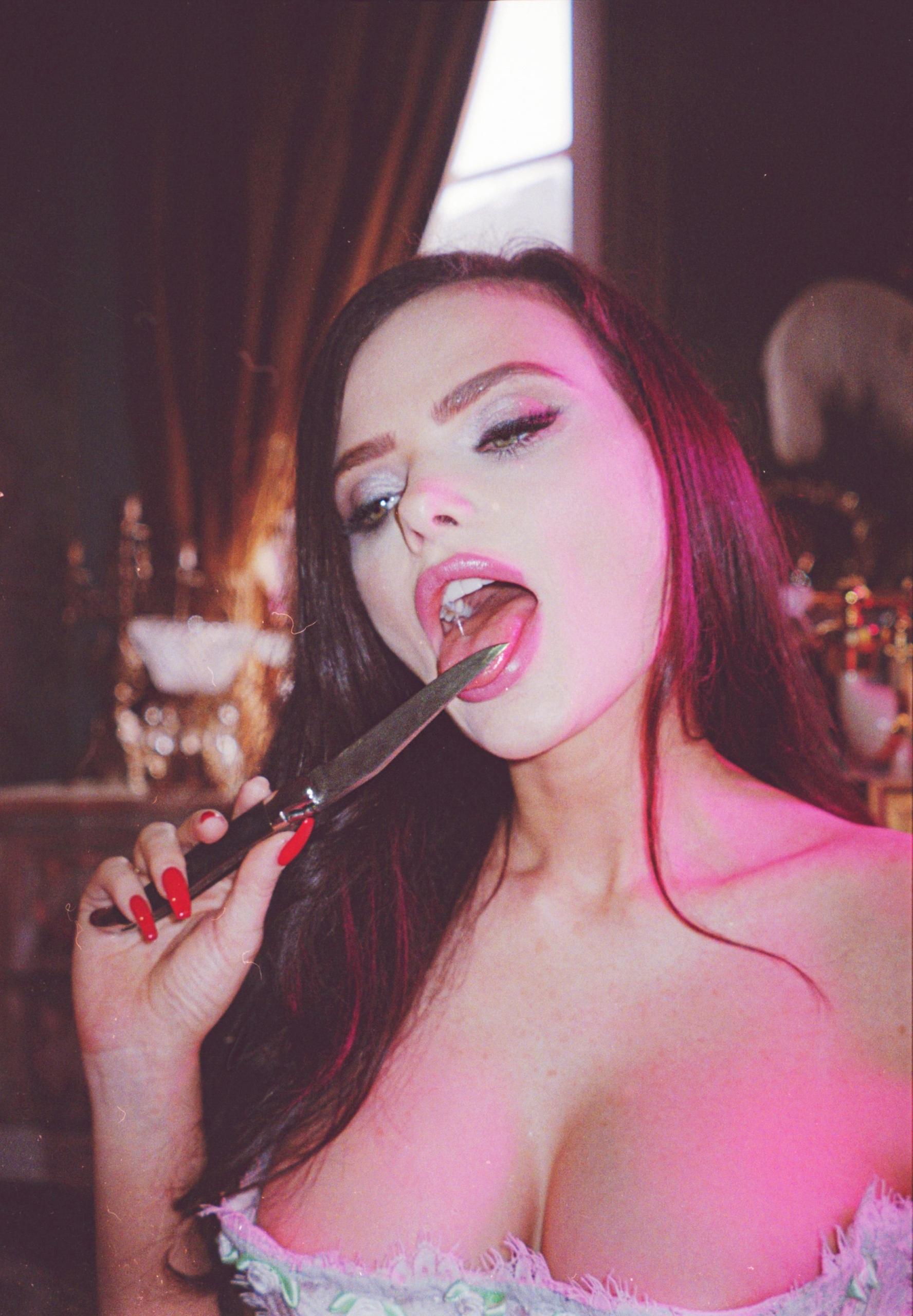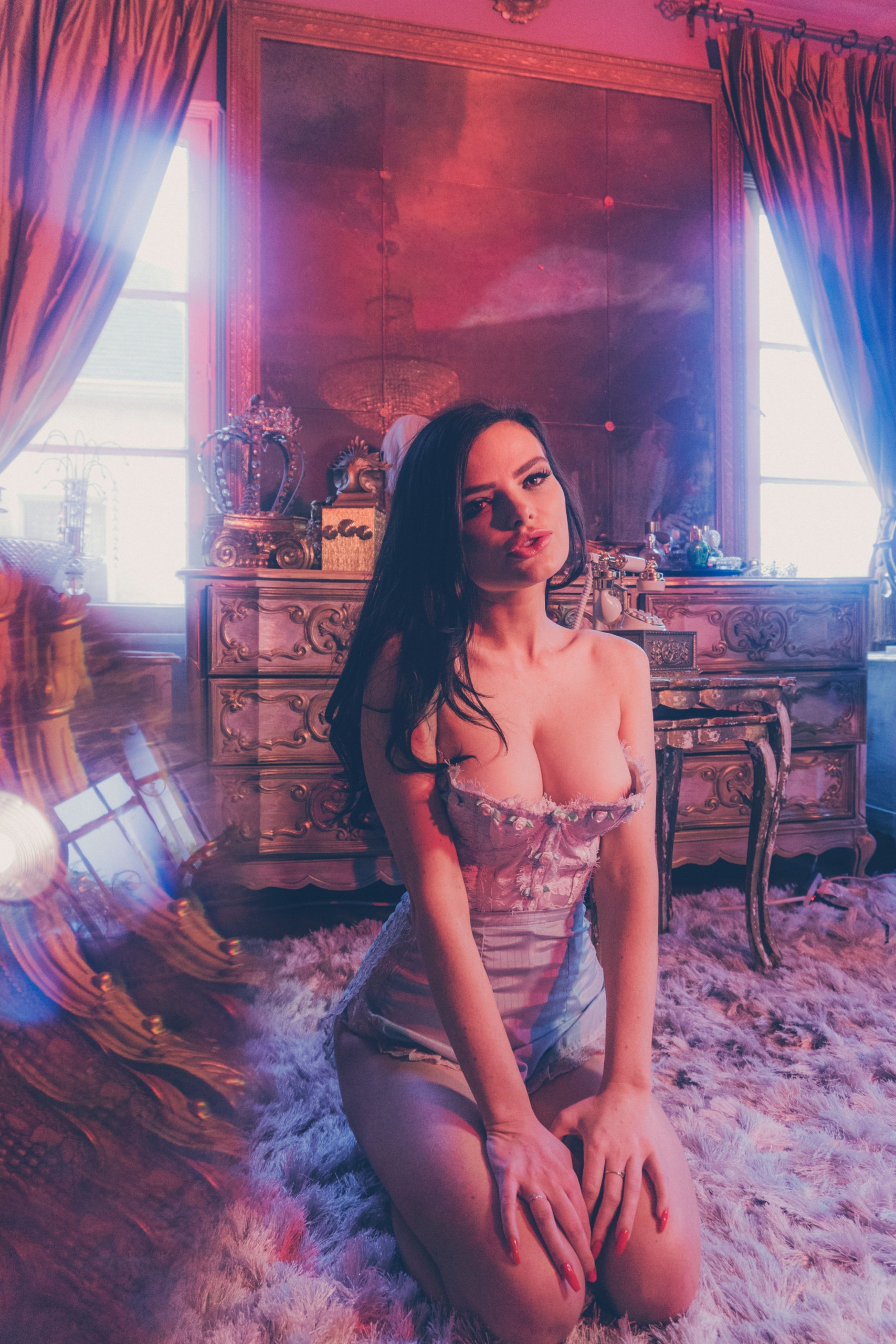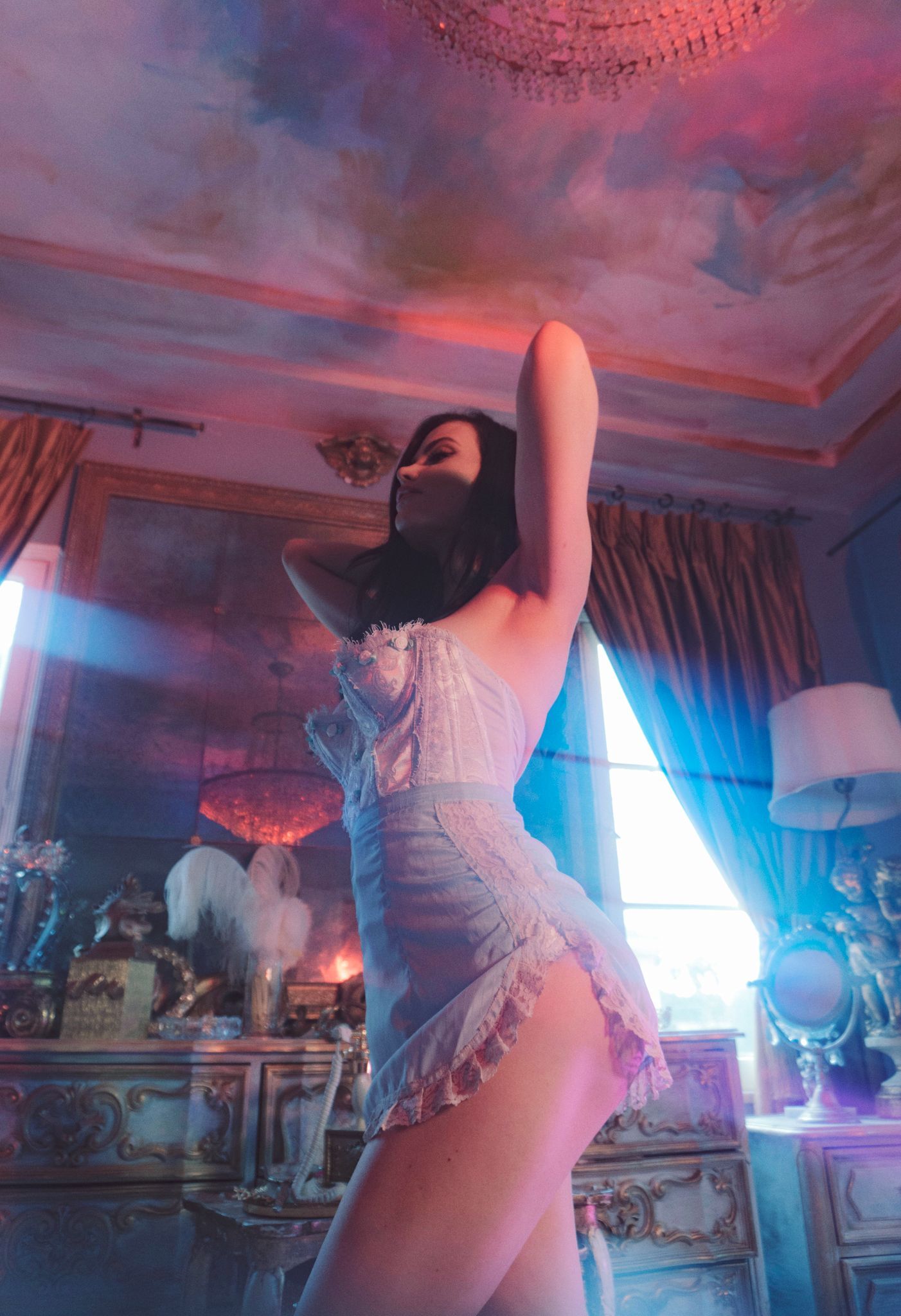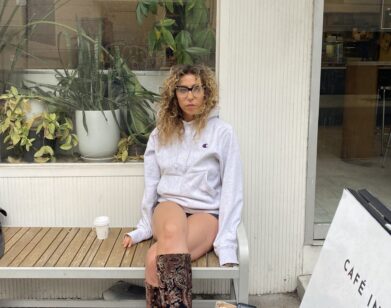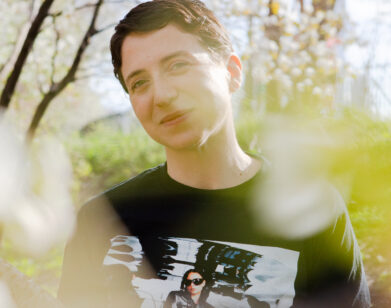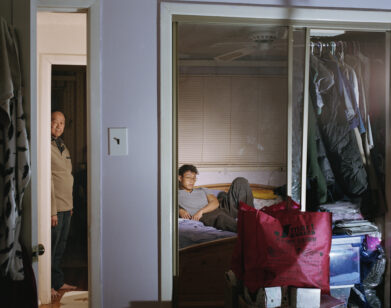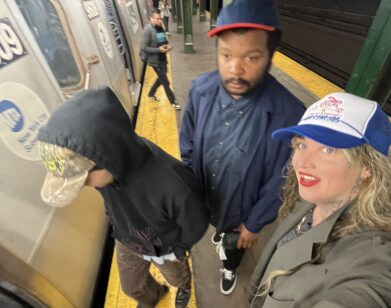SEX, LIES, AND POETRY
Rachel Rabbit White, in Her Boudoir
Nico Walker is the formerly-incarcerated author of Cherry. The novel was released August 2018, and has since been adapted for the screen by the Avengers people and starring Spiderman. The film was set to be released November 2020; however, Walker has been told—via third parties (e.g. the internet)—that, due to concerns about the pandemic, the release may or may not be delayed.
Rachel Rabbit White is the author of Porn Carnival, a collection of poems released November 2019, and the recent poetry series, Work For Love (Triangle House). An expanded reissue of Porn Carnival, Porn Carnival: Paradise Edition, will be in stores Fall of 2020.
Rachel Rabbit White is presently the pious bride of the formerly-incarcerated author Nico Walker.
———
I met Rachel Rabbit White last December. Her first collection of poems, Porn Carnival, had just come out the month before. I’d read an article about the release party, about some angel dust, a little cake-sitting, a DJ, and then something like “Rachel Rabbit White is a sex worker.” It all seemed glamorous and no-fucks-ish. And this was about poetry.
Someone told me the book was good. It was getting a lot of attention. So I read it. It was fierce. It was pure. It stayed with me. It was in earnest, and yet there was no discounting the technique. The lines were as elegant as they were painful. Their intentions were as direct as they were dynamic in their complexities. It wasn’t the work of a dilettante.
I had just gotten out of prison. I was in a halfway house. Weekdays, I went to work at an office. It was a bullshit job. I was making $8/hr, paying 25 percent of the gross of my paychecks back to the halfway house for “subsistence.” I had published a novel the previous year. It was a good thing I had, or I’d have been broke.
I first got in touch with Rachel because I was working on a project for a magazine, and I needed contributors. I emailed her from the burner phone I’d bought at Wal-Mart the day after I got out. I told her about the project, said I liked her poems, her journalism. She didn’t act stuck up or anything. We talked about books and shit. It came naturally to us.
I haven’t gone back to check, but I think there’s only one hyacinth in Porn Carnival. And no one gets bored to death by what existential crises overtake a body in the organic co-op of whatever town Bard College is in. It isn’t that type of book. You get lines such as “these girls were at the wrong orgy,” titles such as “In the Heart-Shaped Jacuzzi of my Soul.” Which isn’t to say it’s all so… rowdy. On god, she reminds me most of Octavio Paz. Still, it’s a book about sex work, mainly.
This didn’t go without controversy. Some took issue with her feelings about her own experience, something to the effect of it being unethical of her to exploit her own exploitation. She was even accused of being a “fake” sex worker. Her accusers were not sex workers, so it’s anyone’s guess how they might know enough to tell a fugazzi from a genuine article, but this is neither here nor there. A few porn stars bowed up to troll for White, and that was the last of people saying she was a fake.
Still, she had a critic or two: people who thought the book and its promotion were at once decadent and thirsty, people who thought that things so decadently thirsty weren’t right for the culture of poesy, people who thought the hype was on account of the party, not on the merit of the art. Naturally, these were educated people. And they were entitled to their ideas, even if they were wrong.
“But how could they be wrong?” you ask.
Read: because they’re jerks.
Read: because there’s no such thing as parties.
There’s only the death dance;
there’s only life.
(They don’t teach this in school.)
The following are three excerpts from dozens of interviews I conducted with White: what we call The Prologue, The Interview, and The Post-Script.
THE PROLOGUE
RACHEL RABBIT WHITE: There’s this tweet format going around, “What was the one thing you did as a bit that just ended up becoming a part of your life in complete sincerity…” I texted that premise to Ben Fama and I was like, “Marrying Nico Walker.”
NICO WALKER: A bit?
WHITE: A bit.
WALKER: What’s a bit?
WHITE: You do it because it’s, like, a part of your life, but it’s whatever. Like with comedians. Commit to the bit.
WALKER: Yeah. You thought I was some fucking hick.
WHITE: I didn’t think you were a hick.
WALKER: This guy writes stupid emails. He’s probably never even been to New York.
WHITE: I just had Gian [DiTrapano, the editor of Tyrant Books] tell me this was a great idea. He said, “You have to date him.” And I was like, “I don’t even know this dude, okay. I’ll commit to the bit, fine.” But the bit got too real! I completely committed to the bit with the utmost sincerity of my life. I was expecting I could be half in, half out.
WALKER: Gian can be convincing. I talked to him on the phone once when I was writing Cherry. I was like, “Fuck this book. There isn’t gonna be a book.”
WHITE: You’re difficult.
WALKER: Yeah, I’m a douchebag. I take this shit serious as fuck—writing or whatever.
WHITE: Double Aries. Gian said we should rob banks together.
WALKER: Terrible advice. When was this?
WHITE: I know the exact day. It was December [2019], and I was on the plane, coming back from my book tour in L.A., hungover as fuck, on no sleep, barely surviving. Got your email. Sent it to Ben to make fun of it—
WALKER: You made fun of my email?
WHITE: Because I was like, “Who the fuck is this person?”
WALKER: You said you had read my book.
WHITE: I think I emailed you back and you gave me your number.
WALKER: I knew who you were. You were a famous lesbian poet and you liked nitrous oxide. Also something about cake-sitting. That wasn’t you, though. That was just people you run with.
WHITE: First of all, you had a shady-ass e-mail.
WALKER: My email was a nom de guerre. I had just gotten out of prison. I was still thinking like a criminal. I was just trying to buy some poems though, for the thing for the magazine. And then you were like, “I’m gonna hook up with this trash-dick motherfucker.” I know exactly the moment it happened.
WHITE: Nico, do you think you’re psychic?
WALKER: No.
WHITE: Do you think I’m psychic?
WALKER: Um… eh… do you want to be?
WHITE: You have to answer me.
WALKER: Oh shit, I don’t know. You’re more psychic than I am, so that at least makes you a little bit psychic. I’m, like, zero. Maybe not zero.
WHITE: You were working on my astral plane when you were in the fucking halfway house.
WALKER: Is that psychic?
WHITE: Technically, yes. It’s intuitive abilities.
WALKER: I was catching up with you on the astral plane the day after… not the day after… no… yeah, it was sometime after I almost died. There was some sort of conversation that we had after that, a dream. We talked about some shit, and I had never seen you in a dream before. So maybe we almost died the other day. Maybe I lost some psychic abilities.
WHITE: Do you know what we talked about?
WALKER: No, I don’t remember. But I do remember the experience. I remember it being very real to life. A couple times with dead friends and family in dreams, it’s different. It seems more real. It’s more tangible. As opposed to being stranded in a truck stop with Indiana Jones and you don’t have any cigarettes and the door’s locked and you can’t get into a convenience store and you don’t have any money anyway. A dream like that.
WHITE: Do you remember the day that I was giving you reiki in my sleep? We were in a field at a ranch. Usually in dreams when you see someone, it’s an amalgamation of your experiences of them, near to them but not quite them. But I was seeing us in complete 3D rendering outside of myself, outside of my own body. To completely see yourself—very trippy.
WALKER: So you had, like, an out-of-body experience, you were looking at yourself in the third person.
WHITE: Well, I was looking into your dreams. You were in a winter scene and I would try to turn it to spring or summer. I was there and you were there. But I was half-asleep as I did this.
WALKER: I think we have enough.
WHITE: We can’t use any of that.
WALKER: We can use some.
THE INTERVIEW
WALKER: What are you writing about?
WHITE: I’m writing more traditional poems, love poems. Lyrical poems. The first ten are being published as a four-week series for the literary magazine Triangle House, as a weekly installment called “Work For Love.” The artist Casey Kauffmann is doing original art for it. The poems shift constantly between the specter of being “in love,” this beautiful human phenomenon, and questioning romantic love as a site of social complicity that’s deeply socially ingrained and fucked.
I’m thinking about how desire is at the center of what it is to be alive and how desire is the root of all suffering. Love and poetry and romance are, like, the only place of enjoyment for me. When feminists like Shulamith Firestone criticize romantic love, namely heterosexual coupling, as a site of oppression, I agree. But sometimes it also feels like romantic love is the only site of release, or even a site of resistance, under capitalism. Maybe I feel this especially as a sex worker, when you’re selling a sense of love or romance for work, the romance “off work” can feel like a space of reclaiming. Yet the new poems are coming so easily, I don’t know if I can trust them.
WALKER: You say these poems are coming too easily to you. How is the process different compared to how it was when you were working on Porn Carnival?
WHITE: Maybe I’m thinking less, or thinking of the reader less. Or I’m just feeling more, editing less. One of my poems begins, “This year I’m sick of thinking.” I am trusting what I call my cord to the heavens, my cord to the below, to muse. I’ve become simple. I’m writing sexual poems. I’m an unenlightened woman.
WALKER: Would you say you’ve consciously allowed yourself to become unenlightened, or do you think it’s sort of a rut you’re in?
WHITE: In Porn Carnival, the carnival was a sort of metaphor for this mechanism of capitalism, this never-ending ride that you can’t get off. You’re on the ride but you’re also the worker operating the ride. And in a way that was a rut, when I was stuck in this mechanism of work and desperate for off-time pleasure. Being in an “undisclosed Southern rural location” during quarantine, I’ve found myself like, “Fuck it, fuck contributing to the machine of New York City.” Maybe a lot of people have found a new dimension of anti-work ethic under quarantine. A lot of sex workers I know, who’ve been able to take a break, are like: how are we going to return to sex work? It’s so hard to imagine returning when you’ve had time out of the hustle. But being out of New York and under quarantine, I’ve just been focused on simply existing as much as I can. And you know, I’m off sleeping pills. I’m off benzos, I’m taking way less oxy. I’m not striving so much.
WALKER: You say you’re feeling more. Would you say your work before was more of an intellectual process?
WHITE: Before, I was constantly running things through the lens of theory and philosophy, creating multiple dramatic voices in the text. I am still thinking about the phenomenology of romance, but the problem of romance is something that’s passed to you as a child, through the family, through the entire world around you. It’s something I’ve always known so intimately, so maybe that’s why in addressing it. There’s a softness, there’s lyricism. I was beating that out of the poems before.
WALKER: So maybe before you were looking outward for your ideas, and now you’re more focused on the personal, the vulnerable. In that, do you think you’ve lost some quality of anonymity in your writing? Or is it about trusting your own voice more?
WHITE: Being a poet is inherently embarrassing, but writing love poems feels especially shameful! Even if we all are trained to want love, and we all do desperately want it, there is also a popular ridicule of love and romance. It’s like how the poet Diane Ackerman says, “As a society, we are embarrassed by love. We see it as an obscenity. And yet love remains the most important thing in our lives, something we need a supple vocabulary for.”
WALKER: The persona, or the voice that predominates Porn Carnival—is it trying to be tough? Does it put up a hard front, or a cynical posture, so as not to be vulnerable?
WHITE: You can’t have the hard exterior. That’s why I can be so soft. You have to have something protecting what it is you give away. But when I think about losing anonymity, I think about ego. And here I think about ego under romance. I think about who I am as a person, who I am as a woman—which is ingrained in me, even if I personally see gender as a little theater. How, since adolescence, when I’ve seen or valued myself as a person, it’s as a person in love. Or maybe if I see myself as a woman, it’s only as a woman in love. In writing about romance, I am aware that my interiority is completely tied to imagining the other. In one poem, I say, “I give you the self I can’t see/god if that’s all romance were/how easy it would be.” That notion that some part of your soul can only be seen through the other or through god. But I’m also thinking about how women are groomed not only for romance but the fucking ocean of eternal love that is motherhood and how that can be misplaced onto the lover. I think when you have been ingrained with that capacity for an infinite spring of giving, you don’t get rid of it if you don’t become a mother, but you can misplace it onto romantic partners. And maybe that can be a problem.
WALKER: That’s true. You read Porn Carnival and there’s a lot of detail and there’s a lot of illustration and a lot of things that are conveyed but you can’t pinpoint specifics. Everything is written about abstractly.
WHITE: And yet, it’s still weirdly such a vulnerable book. I’m interested in shame as a concept. I’m letting myself show my ass. I’m letting myself be vulnerable and I’m letting myself feel unafraid of embarrassment.
WALKER: So, kind of like being submissive to your audience?
WHITE: Yeah, being submissive to my audience and being submissive to muse. As a sex worker, love remains a space of risk and high consequence. Either you’re having to hide your loves, your relationships from your clients, or there’s this idea that love can only be about money, that you should only fall in love with someone with money, if this is your line of work. Or misogynistically that, as a sex worker, you don’t deserve love, or that you’ll face rejection. Yet the idea that it’s harder to date is laughable—we’re the ones who are so good at dating and love and sex that we’re paid for it.
WALKER: It seems like you’re in a place where you’re transitioning out of sex work.
WHITE: I was outed after my book came out. There were other issues, ads shuttering, SESTA/FOSTA. I thought that writing a book of poetry wouldn’t necessarily be a space that would blow up my spot so quickly, but it did. And so, for a lot of reasons, it feels unsafe to work right now. Being outed as a sex worker is like being a public figure that anyone can meet at any time. If you write about your life like I do, they can read your thoughts, see your social media, know where you are, and then if they don’t like it, they can trick you into setting up a meeting with them and take revenge on you. But I don’t like to think of myself as a victim of anything. I don’t have an attitude of “poor me.” I feel blessed all the time.
WALKER: In Porn Carnival, you have this line: “Independence is the gift that keeps on taking.” Has your idea of what that means changed since you wrote these lines? Has your experience with trying to liberate yourself through writing poetry and then having that come back on you changed it?
WHITE: That’s interesting to think about because I’m responding to Lauren Berlant in that line, when Berlant writes that for women, love is the gift that keeps on taking. She’s not addressing sex workers specifically, and I was inserting my experience into my reading of the text. Independence is the freedom to choose your lovers, something that, if you look at history, women have only been able to do very recently. I mean, any woman who has cheated on a partner she no longer loves knows the duality between the passivity of having sex with someone you don’t like and the generosity of having sex with someone you’re in love with.
WALKER: If you have come to define yourself more as a poet than you had before, with writing as it pertains to your own independence, has that changed at all? Because they say money is freedom, and obviously poetry isn’t the most remunerative thing in the world.
WHITE: Poetry for me is pure expenditure. I also want romance as pure expenditure—the problem of love, the problem of money, the problem of only loving poetry.
WALKER: Do you feel you’ve lost anything from the independence that you’ve gained through writing?
WHITE: Obviously I’ve lost money.
WALKER: But do you regret that? And do you think you’ve lost anything in redefining yourself foremost as a poet? Would you trade Porn Carnival to get the money back?
WHITE: Absolutely not. You can’t not be in a deep space of writing without questioning and looking at what it is you truly value. With Porn Carnival, people talked about the luxury in the book, the money, and the speaker’s flippancy toward it. I said the deep space of writing, but maybe that space is similar to the deep space of being submissive to love. How passion comes from pathos, which is to suffer, but more specifically, it means to have something imposed on you. But what I realized writing is that I want to want less, I want to want nothing. It’s like what my teacher Maureen McLane taught me: to be a poet is to aspire to be anonymous, to be a part of the history of lines so passed around they are attributed to anonymity.
WALKER: You said the test of poetry is that it’s true to the spirit of what you’re undertaking—that being anonymity. My reaction reading Porn Carnival was that it was a very confident work. There was a lot of self-assurance in the execution, but at the same time, for as much as it seemed ego-driven on the surface, it seemed at the same time there was this prevailing anonymity. It wasn’t so much Rachel Rabbit White, sex worker, writing these poems, but it also could be any sex worker, and these were poems that were universal to an experience.
WHITE: Yeah, and I guess you get to the universal through specificity.
WALKER: You have to have detail to illustrate and convey things, and if you draw from your own life… you did so from a perspective that was objective.
WHITE: I’m sort of allergic to seeing myself in my writing. Maybe that’s why I used the dramatic voice in Porn Carnival—it’s like having a character. Back when I was writing personal essays, I learned to be self-effacing. I said sex work is a space of self-erasing, and in forgoing ego, responding, as I say in Porn Carnival, “only to the moment and its money,” there isn’t much room for a true self. That kind of self-erasure can be traumatic when it feels forced on you. It’s like accidental ego loss. But maybe it can end up being beautiful when you learn from it how to tamp out your ego or your own needs for other contexts like writing, or even loving.
WALKER: Your life has changed a lot since Porn Carnival came out, like how you lost the anonymity you needed for sex work. You couldn’t work under a nom de guerre anymore. Also, you had been in a relationship for some time, and that ended. There were other things, too. Positive things: recognition, affirmation. Your book resonated with a lot of people. Overall, would you say you feel good about it? Your decisions to go through the madness you went through to get here, to be what you are now—do you feel those are vindicated?
WHITE: The theme of my life has been change. When I started this project on romance, I realized that I’m someone who has let romance dictate all my major life decisions. I haven’t made those big changes based on jobs or money or family, or whatever most people let influence their major life decisions. I’ve let romance run mine. It’s sort of a fucked-up thing to realize—that you’re living your life as a romantic poet. I think of Rimbaud and that line, “We must be absolutely modern,” where romanticism becomes a quest for the new.
WALKER: Could you define, in your own experience, what the process and experience of reading poetry should be like?
WHITE: For me, poetry is meant to be lingered over, pored over in a state of languor and read aloud. To know a poem, you read it more than once. [The Italian poet Eugenio] Montale said poetry is an incurably semantic art. For me, it’s not about ends, it’s not about plot. And that’s what I mean about where I am now personally or strive to be. Poetry is pure being. It’s like how I told you before about poetry versus the novel…
WALKER: The novel being doomed.
WHITE: The novel is doomed to the circumstances of the sum of one’s life, whereas poetry continually strives to reach out of the sum of one’s own life. Because poetry’s goal isn’t clear. It’s sort of a communicative failure. And that’s my fault as a person too—addicted to being in being, in the moment, living this dumb romantic life. I also had a thought about the problem of short stories though. When writing a short story, sometimes it’s like you want to be playing a flute, but you’re stuck playing the trumpet.
WALKER: So that novel being doomed to the circumstances, the pre-conditions of a life, you can’t really go beyond this. So would you say reading prose is more of a passive experience, whereas reading poetry is more of a creative experience?
WHITE: I think reading poetry is closer to music. It’s closer to ecstasy or jouissance, or maybe a prayer or divination. And a novel has to contain poetry, but you’re often reading for a narrative. I love a story, but I also like getting outside of the story.
WALKER: So maybe one is like looking at a blueprint and the other is like looking at a photograph.
WHITE: A novel is like walking through a house and seeing the overlay of the house whereas a poem is like being a child and you’re in the house and you live in the house but you’re tipped upside down on the bed and it’s as though the ceiling could be the floor. You could live on the ceiling as easily as the floor. It’s not understanding entirely what a house is. Or you feel there is more to the house than you can see.
WALKER: Do you think you will finish a novel?
WHITE: I am writing a novel, about the same themes present in Porn Carnival, and my experiences in sex work and supporting partners. I did abandon it during this whirlwind quarantine but I will keep working. I’m also writing a comedy/drama television series with Annelise Ogaard about high-end escorting in New York City.
WALKER: Do you think there are any novelists who have achieved what you attribute to poetry while working in prose?
WHITE: Genet. Clarice Lispector—that whole thing where she eats the cockroach is pure poetry.
WALKER: What about Henry Miller?
WHITE: Oh, interesting you say Miller, since I was about to say Anaïs Nin, and they were fucking. I feel like Miller achieves poetry in his novels, but I’m curious, why didn’t Miller write poetry?
WALKER: He was too opinionated for poetry.
WHITE: That’s true. Maybe we should look at the love letters between Anaïs Nin and Henry Miller. Do they achieve poetry?
WALKER: [Looking at screenshots] Miller conducts a prayer. I wonder. Do I detect any of [the Indian philosopher Jiddu] Krishnamurti’s fingerprints on this?
WHITE: Everyone is just posting Anaïs’s because they’re better. I mean…
WALKER: Who would you say are your favorite poets at the moment? Who are you reading?
WHITE: Alejandra Pizarnik, Omar Cáceres, June Jordan’s love poetry. Jack Gilbert’s love poetry. You got me revisiting Rimbaud. You also got me into Sin by Forough Farrokhzad, which blew me away. I always love Lisa Robertson’s surprising grasp on and use of language. I can open Lisa Robertson to any page and remember, “This is why I do this.” I also loved Elaine Kahn’s new book Romance or The End. And, of course, right now I am looking for all the unashamed love poems, the ones that show their ass and revel in ecstasy.
THE POST-SCRIPT
WHITE: Alright, so, now you gotta acknowledge knowing me since you’ve got out. This is hard.
WALKER: Basically, I’ve known you since I got out, you know…
WHITE: We’ve known each other really well since you got out.
WALKER: And although the [writing project] thing is in limbo, on account of the world ending, or half-ending anyway, you know, it’s not all been a loss. I’ve put you on to some things.
WHITE: Yeah? What have you put me onto?
WALKER: I put you on with François Villon, and then Forough Farrokhzad and Frank Stanford, right?
WHITE: What else have you done?
WALKER: Well, that’s about it. That’s not enough? Let me think. What was that thing where we were talking, and you would tell me a quote about? Suicide. It was, like, from the third text conversation that we had.
WHITE: You’ve gotta tell me more.
WALKER: I forget what it was.
WHITE: Oh, was it [the Romanian philosopher Emil] Cioran? About how it’s always too late to kill yourself?
WALKER: Yeah, that’s it. Thanks for telling me about that. That was good.
WHITE: So how is your life and getting out of prison and being in transition, but also knowing Rachel Rabbit White? What has that brought to your life?
WALKER: Well, you know, it was the thing about it’s always too late to kill yourself, and all sorts of other shit. I fucking respect the fuck out of you. You really hustle, you know. Your work ethic is amazing. It’s a great example for me.
WHITE: I can’t not write. I spent three years not writing, when I was hustling really hard, and it was really painful for me to be separated from writing.
WALKER: I can’t not write either, but I still don’t write…
WHITE: I spent three years not writing. I thought I lost it forever.
WALKER: I’ll go days or weeks. I never get to two weeks, but fuck.
WHITE: I spent three years not writing, Nico.
WALKER: No, I mean, if you’d let me finish…
WHITE: I’m really bad at that.
WALKER: I’m trying to tell you, I’m fucking miserable if I’m not doing it.
WHITE: That’s how I was.
WALKER: It’s panic.
WHITE: It’s panic. There was a giant hole in my life. But I was hustling so hard and building my sex work brand and working so much. I couldn’t fucking write. It was horrible. And plus, everything I wanted to write about was what I was experiencing. I wasn’t out. I knew I couldn’t publish it. That’s really why I switched to poetry, because I was like, “Poetry’s the only way.” But anyway, I still told on myself. I’m always telling on myself.
WALKER: Everybody does.
WHITE: So how has your life out of prison been impacted by knowing Rachel Rabbit White?
WALKER: I’ve done a lot of fucking cleaning up.
WHITE: That’s not fair!
WALKER: I’ve done a lot of cleaning up, picking up glasses and shit. You can always judge an artist by how many glasses they use in a day. I’m a hack. I use one glass all day. I’ll drink wine out of what I was drinking coffee out of in the morning.
WHITE: This girl’s a hedonist.
WALKER: Other people take a sip, and they need another glass. They take a sip, get another glass. They pour the contents of their glass into the new glass, then take another sip, get a new glass. They leave more everywhere. Also, I’ve had to replace some furniture. My rug was set on fire. Under the dining room table. Well, it’s not really a dining room. Under the table. I think I’ve told you this before: I think you come off hard. Sometimes. Maybe not. Maybe it depends on who’s looking at it. You’re a very kind person. You have this instinct to take care of everyone. You’ve got all these friends. You’ve got all these people you know. They all love you, or they seem to love you. You put so much of yourself, so much of your energy, into taking care of other people, into making sure that the people around you are alright. That was unexpected. Not that I thought you were fucked up or something. It’s just, I didn’t expect to see it to such an extent. It’s rare that someone’s like that. I’m not like that.

